

Diana Lunareja on Instagram: “Mi hermana. Maquillaje, peinado y foto de su servidora.” Happy Kid Meme. As We May Think. As Director of the Office of Scientific Research and Development, Dr.

Vannevar Bush has coordinated the activities of some six thousand leading American scientists in the application of science to warfare. In this significant article he holds up an incentive for scientists when the fighting has ceased. He urges that men of science should then turn to the massive task of making more accessible our bewildering store of knowledge. For years inventions have extended man's physical powers rather than the powers of his mind. Trip hammers that multiply the fists, microscopes that sharpen the eye, and engines of destruction and detection are new results, but not the end results, of modern science. This has not been a scientist's war; it has been a war in which all have had a part. For the biologists, and particularly for the medical scientists, there can be little indecision, for their war has hardly required them to leave the old paths. There is a growing mountain of research.
How Your Travels Around the Internet Expose the Way You Think. My journey begins with a magazine article on the origins of human writing.

But then I bounce to a webcomic about a girl superhero, which leads me to obsess briefly over how the hell Superman could really fly. That links me to the equations that describe gravity, which loops me around to Jews in the history of Marvel Comics. This is a map of me dorking around on the Internet. The Death of the Author [1967] – Roland Barthes. In his story Sarrasine, Balzac, speaking of a castrato disguised as a woman, writes this sentence: “It was Woman, with her sudden fears, her irrational whims, her instinctive fears, her unprovoked bravado, her daring and her delicious delicacy of feeling” Who is speaking in this way?
![The Death of the Author [1967] – Roland Barthes](http://cdn.pearltrees.com/s/pic/th/death-author-roland-barthes-101644163)
Is it the story’s hero, concerned to ignore the castrato concealed beneath the woman? Is it the man Balzac, endowed by his personal experience with a philosophy of Woman? Is it the author Balzac, professing certain “literary” ideas of femininity? Is it universal wisdom? Or romantic psychology? Probably this has always been the case: once an action is recounted, for intransitive ends, and no longer in order to act directly upon reality — that is, finally external to any function but the very exercise of the symbol — this disjunction occurs, the voice loses its origin, the author enters his own death, writing begins.
¿Por qué el cerebro prefiere el papel? La reconocida revista Scientifican American publicó un artículo que pretende explicar esta paradoja: en la época de la hiperconectividad, cuando cada vez tenemos más equipos que nos permiten leer y contamos con acceso a bibliotecas enteras en formato electrónico, muchos siguen prefiriendo el papel.
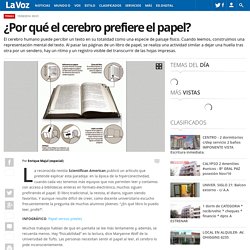
McCollough effect. (click to enlarge) A test image for the McCollough effect.
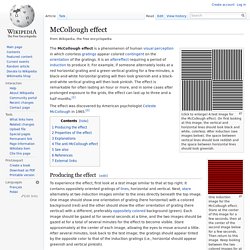
On first looking at this image, the vertical and horizontal lines should look black and white, colorless. After induction (see images below), the space between vertical lines should look reddish and the space between horizontal lines should look greenish. One induction image for the McCollough effect. Stare at the center of this image for a few seconds, then at the center of the second image below for a few seconds.
Then return to this image. A second induction image for the McCollough effect. The effect was discovered by American psychologist Celeste McCollough in 1965.[2] Producing the effect[edit] Properties of the effect[edit] The McCollough effect is remarkable because it is long-lasting. The effect is different from colored afterimages, which appear superimposed on whatever is seen and which are quite brief. The induction stimuli can have any different colors. Explanations[edit] Recommended from Around the Web (Week Ending February 7, 2015) One Man’s Quest to Rid Wikipedia of Exactly One Grammatical MistakeHow one man’s war against the phrase “comprised of” has led him to make tens of thousands of edits to Wikipedia.

—Tom Simonite, San Francisco bureau chief Why the US Government Is Terrified of Hobbyist Drones How the White House drone crash embodies government fears about hobbyist drones. —Tom Simonite The Case Against Always Leaving the Toilet Seat DownA critical look by economists at a key energy-efficiency problem. How Movies Manipulate Your Brain to Keep You Entertained. Colored spots indicate where subjects looked during an action sequence from Iron Man 2.
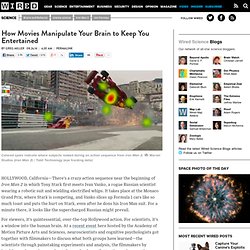
Marvel Studios (Iron Man 2) / Tobii Technology (eye tracking data) HOLLYWOOD, California—There’s a crazy action sequence near the beginning of Iron Man 2 in which Tony Stark first meets Ivan Vanko, a rogue Russian scientist wearing a robotic suit and wielding electrified whips. It takes place at the Monaco Grand Prix, where Stark is competing, and Vanko slices up Formula 1 cars like so much toast and puts the hurt on Stark, even after he dons his Iron Man suit. For a minute there, it looks like the supercharged Russian might prevail. Crítica a nuestro ilusorio albedrío.
Probablemente el nombre Byung-Chul Han suene menos extranjero en Alemania que aquí.
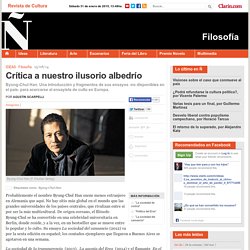
No hay sitio más global en el mundo que las grandes universidades de los países centrales, que rivalizan entre sí por ser la más multicultural. De origen coreano, el filósofo Byung-Chul se ha convertido en una celebridad universitaria en Berlín, donde reside, y a la vez, en un bestséller que se mueve entre lo popular y lo culto. Su ensayo La sociedad del cansancio (2012) va por la sexta edición en español; los contados ejemplares que llegaron a Buenos Aires se agotaron en una semana. La sociedad de la transparencia (2013), La agonía del Eros (2014) y el flamante En el enjambre (2014) van camino a correr la misma suerte.
Quizá sea porque entre las principales preguntas que hoy repican por todo Internet –las primeras en Argentina y otros países, como Alemania, según reveló esta semana un informe de Google– figuran: Por qué estamos tan cansados, por qué estamos solos. La trampa humanista. Qué quiere decir universal?
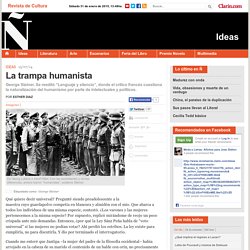
Pregunté siendo preadolescente a la maestra cuyo guardapolvo competía en blancura y almidón con el mío. Que abarca a todos los individuos de una misma especie, contestó. ¿Los varones y las mujeres pertenecemos a la misma especie? Por supuesto, replicó mirándome de reojo un poco crispada ante mis demandas. Ethan Zuckerman: "We Still Don't Understand Very Well How Social Change Occurs in the Digital Age" INTERVIEW | Ethan Zuckerman – Director of the Center for Civic Media at MIT “We still don’t understand very well how social change occurs in the digital age” The Internet is responsible for one of the paradoxes of the digital age.
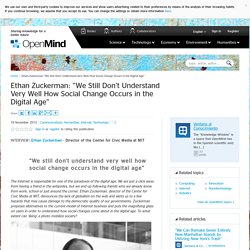
We are just a click away from having a friend in the antipodes, but we end up following friends who we already know from work, school or just around the corner. Ethan Zuckerman, director of the Center for Civic Media at MIT, denounces the lack of globalism on the web and alerts us to a few hazards that may cause damage to the democratic quality of our governments. "Bienvenidos de vuelta al caos" Es reconocido como uno de los mayores intelectuales de la comunicación y la cultura en América latina. Todos los estudiantes de comunicación de los países de la región y de buena parte del mundo han leído y debatido sobre sus textos, en particular sobre Los medios a las mediaciones.
Comunicación, cultura y hegemonía (1987), que transformó profundamente el pensamiento sobre la comunicación, intentando poner a las personas, a la cultura y no a los medios, en el centro del proceso comunicacional. Jesús Martín Barbero (77), español de nacimiento y colombiano por decisión, estuvo en Buenos Aires y dialogó con Página/12. –Desde su llegada a Buenos Aires lo hemos escuchado hablar insistentemente sobre la necesidad de "volver al caos". Llegó a decir "bienvenidos al caos". –Por supuesto. –Pero la modernidad nos ha acostumbrado a asimilar conocimiento con orden y con disciplina. 197, Umberto Eco.
The first time I called Umberto Eco, he was sitting at his desk in his seventeenth-century manor in the hills outside Urbino, near the Adriatic coast of Italy. He sang the virtues of his bellissima swimming pool, but suspected I might have trouble negotiating the region’s tortuous mountain passes. So we agreed instead to meet at his apartment in Milan. I arrived there last August on ferragosto, the high point of summer and the day the Catholic Church celebrates the Assumption of the Virgin Mary. Milan’s gray buildings gleamed with heat, and a thin layer of dust had settled on the pavement. Ethan Zuckerman: "We Still Don't Understand Very Well How Social Change Occurs in the Digital Age" Farmacopornografía. John A. Bargh. When Einstein Met Tagore. El origen de la obra de arte. EL ORIGEN DE LA OBRA DE ARTE MARTIN HEIDEGGERVersión española de Helena Cortés y Arturo Leyte en: HEIDEGGER, MARTIN, Caminos de bosque, Madrid, Alianza, 1996.
Origen significa aquí aquello a partir de donde y por lo que una cosa es lo que es y tal como es. Qué es algo y cómo es, es lo que llamamos su esencia. El origen de algo es la fuente de su esencia. Le Bon - Psicología de las Masas. Estudio sobre la psicología de las multitudes Primera edición francesa: 1895 Buenos Aires - 2004 Prólogo del Traductor Gustave Le Bon.